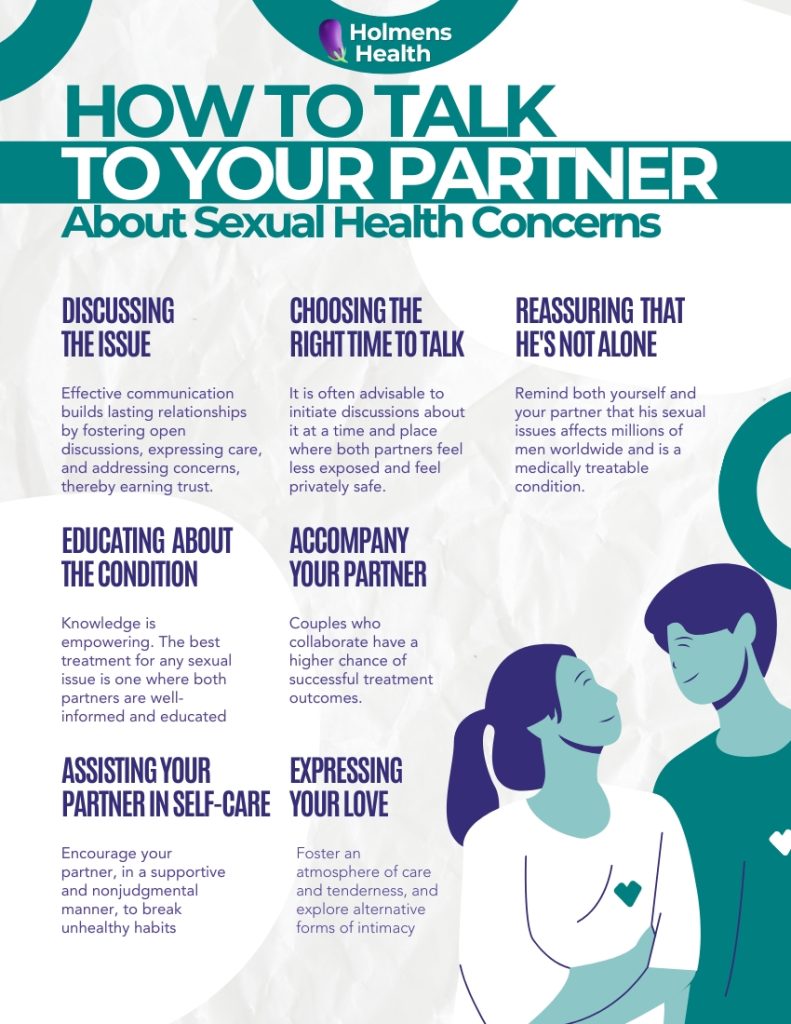How To Talk To Your Partner About Sexual Health Concerns
A long-lasting and fulfilling relationship is rooted in effective communication. The strength of communication serves as the backbone of any successful relationship, fostering mutual trust between both partners. Good communication entails sharing thoughts and feelings, openly and honestly, embracing vulnerability, and demonstrating curiosity about each other’s experiences. It also requires actively listening, being present, and avoiding interruptions or judgment.
All relationships experience ups and downs, but maintaining a healthy communication can ease conflict resolution and contribute to building a stronger and healthier relationship.
When your partner is diagnosed with a sexual dysfunction, it can be mentally distressing for him and may trigger issues like anxiety, depression, and anger, potentially straining your relationship. Due to the stigma surrounding sexual dysfunction, many men feel ashamed and often choose not to disclose their condition out of fear of being judged by their partners and others.
That’s why it is important to cultivate good, honest, and open communication, as it fosters trust and creates a safe space for your partner.
Why Should We Talk More About Sexual Difficulties?
A study published in 2022 by Dr. Anita Elias of The Royal Australian College of General Practitioners (RACGP) shows a significant delay in patients seeking help for sexual difficulties.
Sexual problems are widespread, with 54% of Australian men and 66% of Australian women reporting at least one issue in self-reported survey data. Patients often hesitate to discuss their sexual difficulties due to embarrassment, shame, or the belief that their concerns are not valid.
This hesitation can lead to patients going many years without proper treatment. A 2019 audit of patients at the Sexual Medicine and Therapy Clinic, Monash Health, revealed that individuals experienced sexual difficulties for an average of 6.77 years before seeking help at the clinic.
Among those who sought help, 45% had been experiencing the issue for 1-5 years, 26.3% for 5-9 years, and 20% for over 10 years. Such delays can have serious medical, personal, and relationship consequences.
People with erectile dysfunction tended to seek help more quickly. In contrast, 33% of those with arousal issues waited 5-10 years, and another 33% waited more than 10 years before seeking assistance.
7 Communication Strategies For Sexual Health Concerns
Sexual dysfunction impacts not only men but also their partners. After all, the challenges in sexual health affect both individuals. Like any other health issue, treatment options are available. The real challenge lies not in the illness itself but in the internal stigma experienced by the affected individual and those around them.
That’s why it’s crucial for partners to cultivate effective communication and also nurture open-mindedness, non-judgment, and empathy towards each other.
Outlined by Matthew Solan of Harvard Medical School are seven communication strategies that partners can employ to offer assistance and initiate conversations about their sexual health concerns.
Discussing The Issue
- Effective communication is the foundation of a lasting relationship. By openly discussing your feelings and expressing your care for your partner, you can address concerns and build trust.
Choosing the Right Time to Talk
- When a sensitive topic such as sexual issues arises, it is important to recognise that privacy plays a crucial role, especially for those directly affected. It is often advisable to initiate discussions in a time and place where both partners feel secure and less exposed.
Reassuring Your Partner That He’s Not Alone
- Remind both yourself and your partner that his sexual issues affect millions of men worldwide and is a medically treatable condition. Understand that experiencing any of it does not diminish his interest in sexual intimacy or his feelings towards you.
Educating Yourself About the Condition and Treatment Options
- Knowledge is empowering. The best treatment for any sexual issue is one where both partners are well-informed and educated about each other’s experiences.
Accompanying Your Partner to Doctor’s Appointments
- In general, couples who collaborate have a higher chance of successful treatment outcomes. However, if your partner prefers to visit the doctor alone, respect his privacy. There are other ways you can support his treatment journey.
Assisting Your Partner in Self-Care
- Encourage your partner, in a supportive and nonjudgmental manner, to break unhealthy habits like smoking and excessive drinking, which can contribute to his sexual issues. Promoting healthier habits can improve both his overall health and your sexual relationship. Seeking professional help when creating your self-care routine is crucial. Holmens Health offers holistic services tailored to provide a personalized approach to dietary strategies and exercises, promoting natural ways to alleviate sexual issues.
Expressing Love in Various Ways
- Expand your repertoire of intimate expressions. Sexual satisfaction can be achieved without an erection. Foster an atmosphere of care and tenderness, and explore alternative forms of intimacy in the bedroom, such as extended foreplay and mutual exploration of each other’s bodies.

Book a FREE appointment
One of our Patient Care Coordinators will contact you to discuss tailored treatment options.
This booking is for informational purposes only and does not constitute medical advice. In case of a medical emergency, please call your local emergency number immediately. By submitting this booking, you consent to Holmen’s Health collecting and storing your personal information to provide you with the best possible care. You also confirm that you have read and agreed to our Terms & Conditions and Privacy Policy.
- https://www1.racgp.org.au/newsgp/gp-opinion/is-talking-about-sexual-difficulties-still-taboo
- https://www.health.harvard.edu/blog/7-strategies-for-partnering-up-with-ed-2020111921385
- https://www.news-medical.net/health/How-To-Talk-To-Your-Partner-About-Erectile-Dysfunction.aspx
- https://www.racgp.org.au/afp/2017/january-february/lets-talk-about-sex

